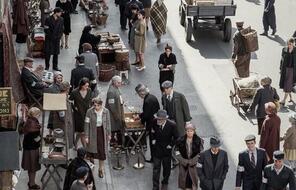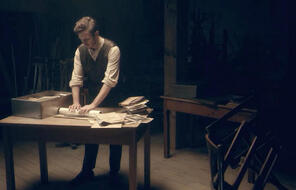Thoroughly Reprehensible Behavior
At a Glance
Subject
- History
- The Holocaust
Wilhelm Kahle, Marie Kahle’s eldest son (see reading, A Family Responds to Kristallnacht), was a student at the University of Bonn. He was called before the university’s disciplinary court for helping a Jewish storekeeper restore order to her shop after Kristallnacht. His “crimes” are spelled out in this “Disciplinary Judgment.”
The student of musicology Wilhelm Kahle will be punished, because of behavior unworthy of a student in regard to the protest action against Jewish businesses, by dismissal from the university and denial of credit for the semester’s work.
On 10 November 1938, there occurred in Bonn, as a result of the murder of the legation councilor vom Rath, a demonstration against Jews, in which the corset shop owned by the Jewess E. Goldstein was affected. On the late afternoon of 12 November 1938, the accused went with his mother to this shop, in which the latter had earlier made purchases. When they arrived at the shop, around 6 or 6:30 p.m., three Jewish females were leaving it. In the shop they met the owner and another Jewish person named Herz. The shop owner was busy putting boxes back on the shelves. After they had been there for about three minutes, Police Sergeant Peter Stammen entered the shop and wrote down the names of the Jewish persons and then also the name of the student Kahle’s mother, and in doing so had some difficulties with the latter. He then turned to the student Kahle, who was putting the boxes that were on the counter back on the shelves, and asked him whether he was an interior decorator. The student said he was not, and then gave his name.
Contrary to the charge, the Disciplinary Court has not been able to determine that the accused intended from the outset . . . to go to the Jewish shop. It is more of the opinion that no preconceived intention lay behind this visit, but rather that the visit took place only on the occasion of passing by the demolished shop. Further, the Disciplinary Court has not derived from the proceedings the impression that the student helped the Jewess put her merchandise back on the shelves but sees the student’s actions simply as an effort, without any special intention, to help the Jewess in her work or to support her in some way.
Nonetheless, the student’s behavior is thoroughly reprehensible. By finding it justifiable to enter a Jewish shop after the given incidents, he seriously endangered the reputation and dignity of the university and thereby violated his academic duties. Articles II and III of the Disciplinary Code for Students, 1 April 1935. He was to be penalized.
The accused’s behavior requires a vigorous atonement. Since the accused seemed to be a little inept and awkward during the proceedings and was obviously under the influence of his mother, the Disciplinary Court has decided in mitigation merely to dismiss him from the university and deny him the credit for the entire semester’s work.
In imposing this punishment, which is mild in relation to the offense, the Disciplinary Court has acted on the basis of the expectation that the student will pursue his further education at a greater distance from his parents’ home, so that in the future he can mature into a more independent, more self-confident and more responsible person. 1
Connection Questions
- How does the disciplinary report extend your understanding of the Kahles’ actions, as described in the reading A Family Responds to Kristallnacht?
- How were Wilhelm Kahle’s actions seen by his university?
- Why might the Nazis have wanted young people to separate from their families?
- The disciplinary court’s report concludes with hope that Wilhelm Kahle will become a more “responsible” person. According to the court, what would make Kahle more responsible? What does it mean to you to be a responsible person?
- 1Uta Gerhardt and Thomas Karlauf, eds., The Night of Broken Glass: Eyewitness Accounts of Kristallnacht (Cambridge, UK: Polity Press, 2012), 90–91. Reproduced by permission from Polity Press.
How to Cite This Reading
Facing History & Ourselves, "Thoroughly Reprehensible Behavior," last updated August 2, 2016.








